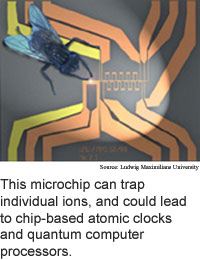
Chip protects single atoms
Researchers from the Max Planck Institute
for Quantum Physics and Ludwig Maximilians University in Germany have
found a way to closely control the quantum states, or traits, of single
atoms trapped in a microchip.
The method is a step toward building devices that depend on traits
of single atoms, like miniature atomic clocks that are an order of magnitude
more accurate than those that exist today, and quantum computers.
Quantum computers would use traits like orientation to store the
ones and zeros of computer information, and would take advantage of the
quirks of the laws of physics at the quantum scale to carry out fantastic
numbers of computations in a relatively small number of steps.
The challenge to using single atoms to store information is that
quantum states tend to be fragile, especially when they are in close contact
with other materials..
The researchers' chip uses magnetic fields to hold neutral atoms
5 to 130 microns above the chip surface at room temperature. The chip
preserve the atoms' quantum states for more than a second, plenty long
enough for most quantum information processing needs.
The key was choosing the right quantum traits. The researchers
use the atom's hyperfine levels, which are subtle sub levels of an atom's
lowest energy, or ground, state.
The microchip trap is a step toward quantum computer chips that
would integrate thousands of atoms.
A miniature atomic clock could become practical within three years,
according to the researchers. Quantum processors are at least ten years
away. The work appeared in the April, 2004 issue of Physical Review
Letters.
Software fuse shorts bugs
Holograms enable pocket projectors
Memory cards make connections
Interface blends screen and video
Briefs:
Paper promises better e-paper
Birds-eye view helps guide public
Nanotubes boost neuron growth
Chip protects single atoms
Mega video enables virtual window
Method tests molecular devices

Research Watch blog
View from the High Ground Q&A
How It Works
RSS Feeds:
News
Ad links:
Buy an ad link
Ad links: Clear History
Buy an ad link
|
TRN
Newswire and Headline Feeds for Web sites
|
© Copyright Technology Research News, LLC 2000-2010. All rights reserved.